 Petzlover
Petzlover Kai Ken is originated from Japan but Pandikona is originated from India. Kai Ken may grow 10 cm / 3 inches shorter than Pandikona. Kai Ken may weigh 18 kg / 39 pounds lesser than Pandikona. Kai Ken may live 4 years more than Pandikona. Both Kai Ken and Pandikona has same litter size. Kai Ken requires Moderate Maintenance. But Pandikona requires Low Maintenance
Kai Ken is originated from Japan but Pandikona is originated from India. Kai Ken may grow 10 cm / 3 inches shorter than Pandikona. Kai Ken may weigh 18 kg / 39 pounds lesser than Pandikona. Kai Ken may live 4 years more than Pandikona. Both Kai Ken and Pandikona has same litter size. Kai Ken requires Moderate Maintenance. But Pandikona requires Low Maintenance
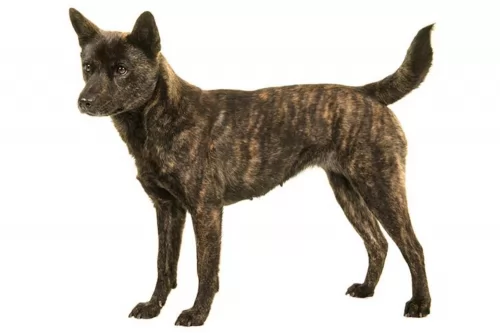 The Kai Ken dog hails from Japan and is both an ancient and rare dog. In fact the dog was discovered in 1929 in the Kai province near Mount Fuji. The dog has the nickname Tora Inu in Japan which means 'Tiger Dog'. Maybe its got to do with the brindle striped coat or his bravery.
The Kai Ken dog hails from Japan and is both an ancient and rare dog. In fact the dog was discovered in 1929 in the Kai province near Mount Fuji. The dog has the nickname Tora Inu in Japan which means 'Tiger Dog'. Maybe its got to do with the brindle striped coat or his bravery.
He falls into the working class category. In 1931, the Kai Ken Aigokai registry was formed to preserve the dog. In fact in this year Dasuke Adachi discovered these dogs and in 1934 was actually designated a Natural Monument in Japan and also protected by law.
The Kai Ken was recognized in 1934 by the Japanese Kennel Club. It is not 100% certain but it is thought that the dog was brought to the United States in the 1950s.
 The Pandikona hails from the village of Pandikona, India, but is in danger of becoming extinct. They have always been well adapted to the harsh conditions of the Kurnool district in India, and they are considered to be a primitive-type dog breed.
The Pandikona hails from the village of Pandikona, India, but is in danger of becoming extinct. They have always been well adapted to the harsh conditions of the Kurnool district in India, and they are considered to be a primitive-type dog breed.
It has always been a territorial dog that has been used to guard villages and today it’s a dog which isn’t recognized as a standardized breed by any of the major kennel clubs. It is essentially a companion dog today.
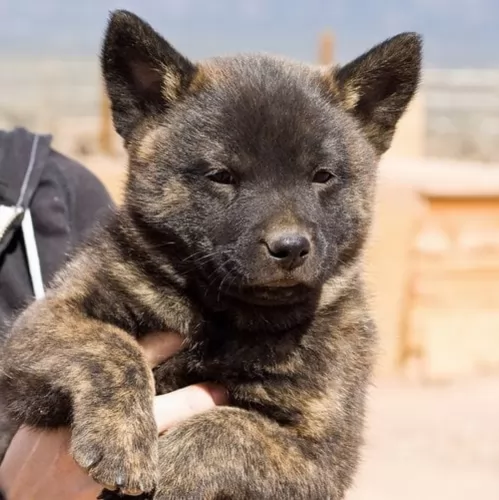 The Kai Ken has always been used for hunting purposes. He comes as recommended for hunting people and those who are active.
The Kai Ken has always been used for hunting purposes. He comes as recommended for hunting people and those who are active.
It is a medium sized dog standing at between 43 to 56cm in height both male and female and weighing between 14 and 22kg.
The ears of the dog are erect, the muzzle is fairly tapered and the nose is black. The tail is bushy like that of a fox and curls over the back. The double coat of the dog is of medium length and harsh and is a brindle color in a reddish or black shade.
Puppies are born black and then the brindle stripe-like pattern comes in later. He has an athletic body and is a keen swimmer.
The Kai Ken is an intelligent dog, loyal to his human family while being somewhat reserved around strangers. They are amicable with both children in the home as well as other pets.
He is a friendly, intelligent dog, forming close bonds with his family. Have him trained and socialized and he'll make you a splendid pet who will be willing to guard you if anyone threatens.
One look at that bright face and you can see that he is an intelligent, independent dog. He is also courageous and fearless and makes a great watchdog, especially because he is naturally reserved and suspicious with strangers.
 The Pandikona is a medium sized sighthound which stands at between 48 and 66cm in height and weighs in the region of 30 – 40kg. They are actually slightly built dogs, although the Pandikona can come in a variety of sizes as there is no selective breeding.
The Pandikona is a medium sized sighthound which stands at between 48 and 66cm in height and weighs in the region of 30 – 40kg. They are actually slightly built dogs, although the Pandikona can come in a variety of sizes as there is no selective breeding.
The breed’s coat is essentially short-haired and smooth with colors varying from solid fawn, white to black with white patches. Brindle is also sometimes seen. They are slim, muscular dogs with erect ears and a long tail that most times curves upwards.
These intelligent and very independent dogs are found roaming around Indian villages and guarding their owner’s property. They are territorial dogs, they are fearless too and make excellent guard dogs. They get on well with children as well as with pets, and with training they become loyal and faithful companions.
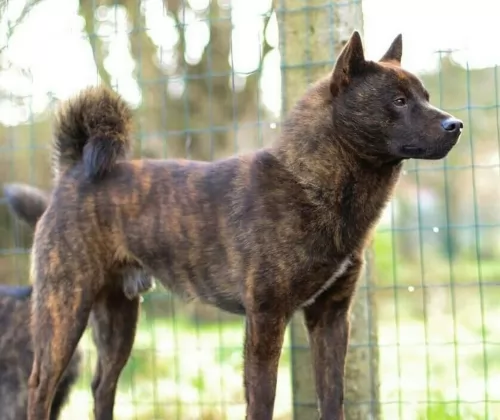 The Kai Ken is a working- and hunting dog, so he is used to being active and will want a home where he can be played with and exercised regularly.
The Kai Ken is a working- and hunting dog, so he is used to being active and will want a home where he can be played with and exercised regularly.
He can be slightly stubborn and independent so training and socialization are imperative. This is also because the dog’s curiosity and his athletic skills can lead to trouble if he isn’t properly trained.
Treat him the way he deserves and you’ll see that he is able to develop a strong bond with you and be altogether an excellent family pet.
 The Pandikona may well be a primitive-type hunting dog from India but he is robust and low maintenance, and capable of making a splendid pet. That is one huge tick in his favor already.
The Pandikona may well be a primitive-type hunting dog from India but he is robust and low maintenance, and capable of making a splendid pet. That is one huge tick in his favor already.
He is an active dog who likes to be kept busy but that doesn’t mean he is too busy to give his human family his loyalty and companionship. Easy to keep, the Pandikona promises to make you the most fantastic pet and friend.
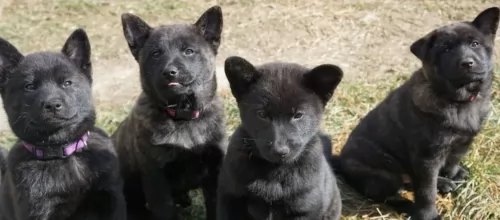 With a lifespan of 14 to 16 years, and given the genetic purity of the Kai Ken, you aren't likely to battle with congenital health problems with your dog, but it is always good to be aware of certain minor health issues that he could succumb to.
With a lifespan of 14 to 16 years, and given the genetic purity of the Kai Ken, you aren't likely to battle with congenital health problems with your dog, but it is always good to be aware of certain minor health issues that he could succumb to.
He can suffer from a few common dog diseases such as progressive retinal atrophy or hip dysplasia.
This is a disease of the eye where there is wasting of certain parts, and in this case the cells of the retina develop abnormally. This can eventually lead to blindness. It’s an inherited disease that can occur in pure- and mixed breeds, and dogs with PRA shouldn’t be used for breeding.
It isn’t a painful condition, and the first symptom usually noticed in a dog is night blindness where you may notice him bumping into things at night and being reluctant to walk around in the dark.
 Dogs are totally dependent on us for their care, and it is our responsibility to keep our eyes on them to ensure they are happy and healthy. It can be to you and your pet’s benefit to know some of the most common health problems that dogs face.
Dogs are totally dependent on us for their care, and it is our responsibility to keep our eyes on them to ensure they are happy and healthy. It can be to you and your pet’s benefit to know some of the most common health problems that dogs face.
The Pandikona dogs are super hardy – used to roughing it - and they’re not going to require much veterinary care. Even though this is such a hardy dog, you can never tell if a sudden canine illness strikes your pet. Sometimes it will be necessary to get your pet to the vet to be examined and to receive medication.
This is very common in dogs and an ear infection can be triggered by dirt and wax in the ear, allergies and ear mites or something else. Your dog will be scratching at his ear, shaking his head, there will be redness and possibly discharge and a nasty odor. Don’t hesitate to take your pet to the vet.
Roundworms, tapeworms and hookworms are horrible parasites that can cause a whole lot of unpleasant symptoms in your dog. He could have a cough, a dull, listless coat, diarrhea, a lack of appetite and weight loss. Treatment from the vet will depend on the type of worm that has infested your pet.
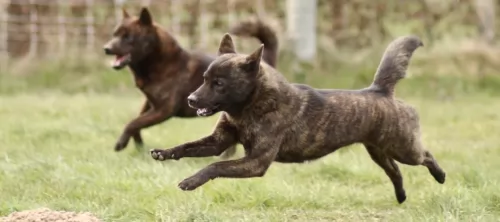 Even though the coat is thick, the Kai Ken will require basic canine care, so a brush twice a week will be enough to keep the coat free of loose hair. He sheds more heavily a couple of times a year and then he will require more brushing.
Even though the coat is thick, the Kai Ken will require basic canine care, so a brush twice a week will be enough to keep the coat free of loose hair. He sheds more heavily a couple of times a year and then he will require more brushing.
He has always been used to hunt so he is a dog that will require regular exercise such as walks, hikes, swimming and ball games.
The nails of the dog should be trimmed regularly once they become long as long nails can be hazardous and can hook onto things, causing injury to the nail area.
The ears of the dog should be checked regularly for fleas and ticks, and teeth should also be brushed with canine toothbrush and toothpaste.
 There isn’t much information on the Pandikona but they have always spent their time roaming free around Indian villages. They’re used to having a lot of space to run and won’t do well in cramped spaces in the city. He wants to be busy and will certainly require you taking him on walks or allowing him to run free in a park. Ball games will also be appreciated as he loves lots of activity.
There isn’t much information on the Pandikona but they have always spent their time roaming free around Indian villages. They’re used to having a lot of space to run and won’t do well in cramped spaces in the city. He wants to be busy and will certainly require you taking him on walks or allowing him to run free in a park. Ball games will also be appreciated as he loves lots of activity.
Food is so very important to the health of dogs. As pets, the Pandikona deserves to have nutritious food which has all the right vitamins and minerals.
These days the best commercially manufactured dog foods can be a good choice for your pet and you choose these foods by reading the labels on the packaging and going according to the dog’s size, his activity levels and his age.
Dogs thrive on homemade food, especially when its simple and nutritious. Boiled chicken, some brown rice or pasta and some cooked vegetables such as sweet potato, spinach and carrots all chopped up and added into his kibble from time to time can only do him good. Some raw meat added in occasionally can also be immensely beneficial. Make sure he has always got a constant supply of fresh, cool water.
Check your Pandikona over from time to time. Check inside his ears for redness and signs of infection and check his eyes too. Brush him at least twice a week to get rid of dust and loose hairs. Trim his nails too and check inside his mouth for bad teeth.
Never ever leave him in a hot car or outside without shade and water. Make sure he has a nice dry comfortable place to sleep. He gives you unconditional love and companionship, and in exchange for this you want him to be well provided for.